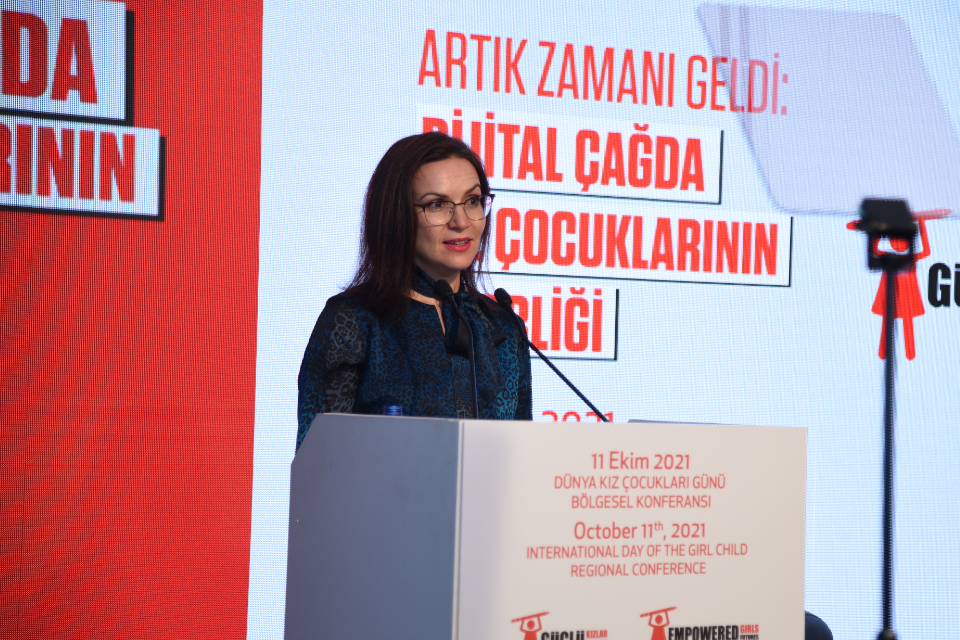International Day of the Girl Child conference in Turkey puts a spotlight on girls as future leaders in the digital era
How do you empower girls and support their leadership in the digital world? This was the focus of the Seventh International Day of the Girl Child Conference, organized by UN Women, the United Nations Children’s Fund (UNICEF) and the United Nations Population Fund (UNFPA) in Turkey, in partnership with the Aydın Doğan Foundation.
Date:

The theme of the 7th International Day of the Girl Child Conference, which took place on 11 October 2021, was The Time is Now! Girls’ Leadership in the Digital Era. Distinguished participants underlined the importance of empowering girls with high-tech skills and supporting their leadership in the digital era. They also noted that through collaborative efforts, much progress has been made to overcome several challenges faced by girls and that it was time to address the gender inequality in the digital world.
This year’s event was live-streamed on YouTube and included speakers from UNICEF, UN Women, UNFPA and the Aydın Doğan Foundation who focused on how the current generation of adolescent girls can become leaders of the digital age with support and collaborative efforts.
The keynote speaker, Afshan Khan, UNICEF Regional Director for Europe and Central Asia, highlighted the need to encourage girls and to give them the opportunity to assume leadership in the digital world: "We know that by providing girls and women with tools for self-empowerment and equal participation, we invest not only in individuals but also in building stronger communities. The time is now for all of us – governments, the international community, the private sector, experts, parents, teachers, community members, girls and boys – to accelerate our support so that adolescent girls’ can safely and meaningfully participate in advancing gender equality. The time is now to support young women and girls to advance their skills, leadership capacity and to become the champions of gender equality, especially in a more digital future. Together, we can and must continue to work to achieve gender equality, for every child.”
Vuslat Doğan Sabancı, Vice Chairwoman of the Aydın Doğan Foundation, said: “Despite all the positive developments in protecting women’s and girls’ equal rights through the efforts of states, civil society and individuals in recent years, girls still face gender prejudice and inequalities worldwide. One of the most striking of these areas is "digital inequality", which is vital for the era we live in. In low- and middle-income countries, three hundred million fewer women than men have access to the internet on a mobile. This is roughly the equivalent of the entire population of the United States. This digital divide increasingly challenges women and girls' access to life-enhancing services such as education, health, and financial inclusion. It is critical to establish strategies that will enable technology to become a great equalizer rather than a destructive force.”
At the opening speech of the panel titled ‘Girls’ Empowerment in the Digital Age: Opportunities and Challenges’, UNFPA Turkey Representative, Hassan Mohtashami, focused on the importance of raising girls’ awareness on cyberbullying and digital violence. “We are all aware that girls are an important part of the online interaction and learning process since they are active members of the digital world. And the psychological impact of what girls experience during their developmental years, which is now more affiliated with the online environment, will accompany them throughout their lives. For this reason, it is much more critical that adolescent girls learn their rights in the digital world, have a voice and leadership in the online environment, and claim their bodily autonomy to make decisions. At UNFPA, we will continue to advocate for the sexual and reproductive health and rights of women and girls, also in the digital age, while leaving no one behind.”
UN Women Turkey Country Director Asya Varbanova stated that girls should have access to and use of digital technology not to be left behind in the 21st century. “Every girl has a right to be connected and to play her part in shaping a more equal, green and tech-driven future. We need to harness the ideas, talents and energy of young people – particularly of young women and girls – using the advantages of the digital space, to deal with the complex challenges of today and realize the Sustainable Development Goals (SDGs).”
As part of the annual Conference, UNICEF, UNFPA, UN Women and the Aydın Doğan Foundation published a statement alongside 114 children and young people, emphasizing the need for gender equality in the digital world. The statement called for gender stereotypes and sexist content to be addressed across social media, advertisements, TV, and in schoolbooks. The statement also called for an increase in the number of funds for girls in the fields of sports, arts, science, and education.
Young leaders voiced a call to action at the end of the conference, addressing political leaders, the private sector, civil society, families and youth. “Take action now, before one more girl faces abusive content online; before one more young woman is denied a job because of her gender; before one more student gives up on their hopes for their future. Start an initiative, develop an inclusive policy, build a committee or connect with the civil society this year to address girls’ needs in your community. Let’s make today, 11 October 2021, the day we all took an important step to advance girls’ empowerment and leadership.”
Those who missed the conference or want to re-watch can do so here.
For more information: İpek Naz Çınar, [ Click to reveal ]